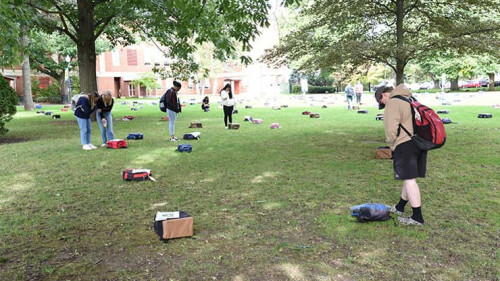
By Noelle Pagan '17
On Monday October 19, Louis DeCaro, Jr., Ph.D., associate professor of church history at Alliance Theological Seminary, hosted a lecture for the Siena Community on abolitionist John Brown. In his lecture, DeCaro aimed to shift the public perception of Brown from “terrorist” to “hero.”
DeCaro’s main argument focused on the fact that many of the fallacies surrounding Brown truly have nothing to do with his character, but rather, the controversy that he generated by aiding slaves. Brown believed that pacifism was not going to end slavery and ultimately attempted to start a liberation movement among enslaved African Americans in Harpers Ferry, Virginia in 1859.
“In 1859 there was only one man who had a plan [to end slavery] and only one man who tried,” noted DeCaro.
Unfortunately, Brown’s liberation attempt at Harpers Ferry failed, and he was accused of insurrection. DeCaro believes that Brown did not intend to incite insurrection; as Brown explicitly denied it during his time.
“The accusation that he was an insurrectionist, is something that if you’ve studied, as I have, came out of the pro slavery, and actually was the accusation that slaveholders made. You hear a lot of these things and they have no basis in history and most of these ideas actually came from slaveholders feeding this information into pro slavery papers,” argued DeCaro.
The lecture helped better familiarize students with John Brown and broaden their perspectives on an important aspect of American history.
“Before listening to the presentation given on John Brown, I didn't know much about him. Hearing Louis DeCaro talk about what John Brown contributed to the abolition of slavery inspired me to think about the question he asked at the beginning. Was he a terrorist or a hero? Listening to his speech made me aware of John Brown's ideas and the reasoning behind his decision to use those ideas,” said Alison Condon ‘19.

